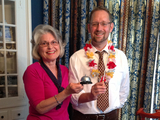Welcome INDS Director Dr. Freeland!
Last week, Patricia La Noue officially handed over leadership of the INDS program to incoming director Stephen Freeland.
Stephen comes to us from Hawaii where he managed an interdisciplinary team of scientists who together comprised one of the 14 nodes of the NASA Astrobiology Institute (https://astrobiology.nasa.gov/nai/). In his personal research, Stephen is an evolutionary biologist, interested in the origins of fundamental biochemistry. Over time, his research questions have grown beyond traditional disciplinary boundaries - for example, his most recent research publication reports a mineral in Martian meteorites that might help scientists understand the origin of life on Earth! (http://www.plosone.org/article/info:doi/10.1371/journal.pone.0064624)
Stephen comes to us from Hawaii where he managed an interdisciplinary team of scientists who together comprised one of the 14 nodes of the NASA Astrobiology Institute (https://astrobiology.nasa.gov/nai/). In his personal research, Stephen is an evolutionary biologist, interested in the origins of fundamental biochemistry. Over time, his research questions have grown beyond traditional disciplinary boundaries - for example, his most recent research publication reports a mineral in Martian meteorites that might help scientists understand the origin of life on Earth! (http://www.plosone.org/article/info:doi/10.1371/journal.pone.0064624)
Stephen comes to INDS with both great respect for the existing program and with enthusiastic vision for growth over the next five years. "I perceive my mission is to sustain and consolidate the many strengths of INDS while finding creative new ways to connect with the broader campus community - and with the world beyond Hilltop Circle". Of
particular interest to him are the interface between science and religion ("With its diverse student body spanning so many dimensions of
contemporary American society, UMBC has a powerful voice to offer
here"), and the ways in which arts, humanities and social sciences can
communicate and facilitate research in science and engineering ("It is
easy to forget that the very concept of a graph was an early
interdisciplinary invention - using art to understand a mathematical
relationship was a radical idea. What new opportunities are emerging for
us to communicate scientific knowledge - through writing, music and
art?")
Overarching these examples of specific interest, Stephen
is eager to listen and learn from the collective insights of those
already engaged with INDS: "I welcome the chance to meet with any of our
majors, alums, faculty and friends who feel that they have an idea to
share."
Posted: July 6, 2013, 9:41 AM
